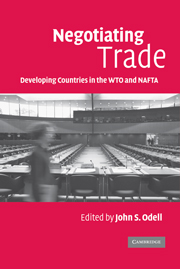28 results
14 - Why Did They Finally Reach Agreement?
-
-
- Book:
- Negotiating the Paris Agreement
- Published online:
- 24 September 2021
- Print publication:
- 07 October 2021, pp 284-313
-
- Chapter
- Export citation
International Monetary Cooperation, Domestic Politics, and Policy Ideas
-
- Journal:
- Journal of Public Policy / Volume 8 / Issue 3-4 / July 1988
- Published online by Cambridge University Press:
- 08 April 2017, pp. 229-233
-
- Article
- Export citation
From London to Bretton Woods; Sources of Change in Bargaining Strategies and Outcomes*
-
- Journal:
- Journal of Public Policy / Volume 8 / Issue 3-4 / July 1988
- Published online by Cambridge University Press:
- 07 April 2017, pp. 287-315
-
- Article
- Export citation
Bounded Rationality and Economic Diplomacy: The Politics of Investment Treaties in Developing Countries. By Lauge N. Skovgaard Poulsen. New York: Cambridge University Press, 2015. 264p. $103.00 cloth.
-
- Journal:
- Perspectives on Politics / Volume 15 / Issue 1 / March 2017
- Published online by Cambridge University Press:
- 15 March 2017, pp. 304-305
- Print publication:
- March 2017
-
- Article
- Export citation
How Should the WTO Launch and Negotiate a Future Round?
-
- Journal:
- World Trade Review / Volume 14 / Issue 1 / January 2015
- Published online by Cambridge University Press:
- 02 January 2015, pp. 117-133
- Print publication:
- January 2015
-
- Article
- Export citation
Investing in Protection: The Politics of Preferential Trade Agreements between North and South. By Mark S. Manger. New York: Cambridge University Press, 2009. 284p. $82.00 cloth, $33.00 paper.
-
- Journal:
- Perspectives on Politics / Volume 9 / Issue 1 / March 2011
- Published online by Cambridge University Press:
- 15 March 2011, pp. 228-229
- Print publication:
- March 2011
-
- Article
- Export citation
Contributors
-
-
- Book:
- The Cambridge Dictionary of Christianity
- Published online:
- 05 August 2012
- Print publication:
- 20 September 2010, pp xi-xliv
-
- Chapter
- Export citation
Robert D. Putnam and Nicholas Bayne, Hanging Together: Cooperation and Conflict in the Seven-Power Summits, revised and enlarged edition. London: Sage Publications, 1987, 293pp
-
- Journal:
- Journal of Public Policy / Volume 8 / Issue 1 / January 1988
- Published online by Cambridge University Press:
- 28 November 2008, pp. 105-106
-
- Article
- Export citation
List of contributors
-
- Book:
- Negotiating Trade
- Published online:
- 22 September 2009
- Print publication:
- 16 February 2006, pp ix-ix
-
- Chapter
- Export citation
4 - The strict distributive strategy for a bargaining coalition: the Like Minded Group in the World Trade Organization, 1998–2001
-
-
- Book:
- Negotiating Trade
- Published online:
- 22 September 2009
- Print publication:
- 16 February 2006, pp 115-144
-
- Chapter
- Export citation
Part II - Regional negotiations
-
- Book:
- Negotiating Trade
- Published online:
- 22 September 2009
- Print publication:
- 16 February 2006, pp 175-176
-
- Chapter
- Export citation
Contents
-
- Book:
- Negotiating Trade
- Published online:
- 22 September 2009
- Print publication:
- 16 February 2006, pp v-vi
-
- Chapter
- Export citation

Negotiating Trade
- Developing Countries in the WTO and NAFTA
-
- Published online:
- 22 September 2009
- Print publication:
- 16 February 2006
Index
-
- Book:
- Negotiating Trade
- Published online:
- 22 September 2009
- Print publication:
- 16 February 2006, pp 289-298
-
- Chapter
- Export citation
Part III - WTO Dispute Settlement Negotiations
-
- Book:
- Negotiating Trade
- Published online:
- 22 September 2009
- Print publication:
- 16 February 2006, pp 217-218
-
- Chapter
- Export citation
Frontmatter
-
- Book:
- Negotiating Trade
- Published online:
- 22 September 2009
- Print publication:
- 16 February 2006, pp i-iv
-
- Chapter
- Export citation
List of figures
-
- Book:
- Negotiating Trade
- Published online:
- 22 September 2009
- Print publication:
- 16 February 2006, pp vii-vii
-
- Chapter
- Export citation
Acknowledgments
-
- Book:
- Negotiating Trade
- Published online:
- 22 September 2009
- Print publication:
- 16 February 2006, pp x-xii
-
- Chapter
- Export citation
3 - Reframing the issue: the WTO coalition on intellectual property and public health, 2001
-
-
- Book:
- Negotiating Trade
- Published online:
- 22 September 2009
- Print publication:
- 16 February 2006, pp 85-114
-
- Chapter
- Export citation
Part I - Multilateral negotiations
-
- Book:
- Negotiating Trade
- Published online:
- 22 September 2009
- Print publication:
- 16 February 2006, pp 39-40
-
- Chapter
- Export citation

